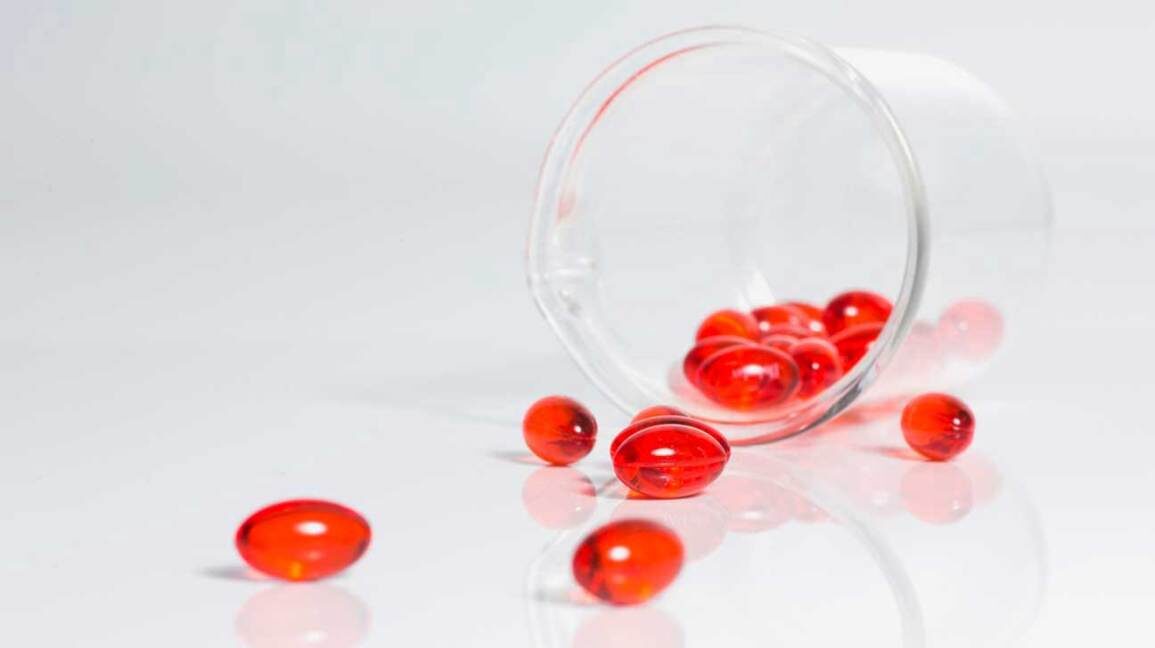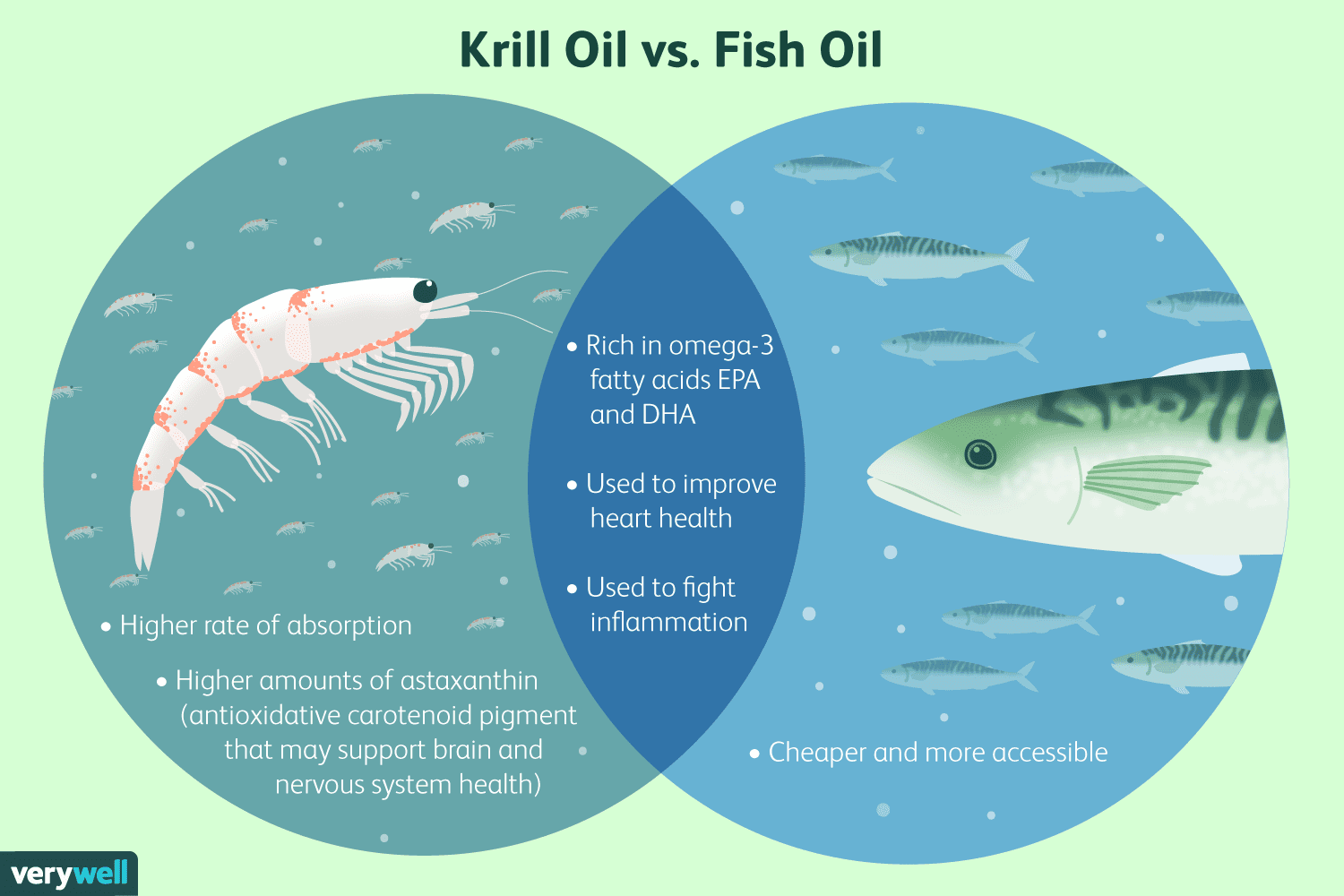Krill Oil vs. Fish Oil – which one is healthier for consumption is a question that the health-conscious group often asks doctors and nutritionists. We have compiled everything that you need to know about these two varieties of oil supplements.
Fish oil is an oil supplement derived from fatty fish like salmon, mackerel, and anchovies. It is one one the most popular dietary supplements consumed by individuals all over the world.
Fish oil is rich in two types of Omega-3 fatty acids- Eicosapentaenoic Acid, or EPA, and Docosahexaenoic Acid, or DHA. EPA and DHA are known for the various medicinal benefits it provides.
Krill oil is a substance that has gained popularity off late as a dietary supplement. It has been derived from tiny sea creatures called the Antarctic Krill. Animals largely consume these creatures like penguins, whales, and seals.

How is Krill Oil different from Fish Oil?
The best way to answer krill oil vs. fish oil is to differentiate the two oils. Some of the critical differences between krill oil and fish oil are:
#1 Krill oil structurally looks different from fish oil. While fish oil is yellow, krill oil is reddish in color due to a naturally occurring antioxidant called astaxanthin.
#2 Krill oil is absorbed better by the body because of the presence of fatty acids in the form of phospholipids. On the other hand, fish oil has fatty oil in the form of triglycerides that the body absorbs less efficiently.
#3 Krill oil is rich in the antioxidant astaxanthin, which has numerous medicinal benefits, while fish oil does not contain this.
Benefits of Krill oil and Fish oil
When studying krill oil vs. fish oil, taking into account the various benefits of the two bits helps make an informed choice between the two. Here is a list of benefits provided by krill oil and fish oil, respectively.

Krill Oil
#1 Krill oil improves the absorption of the DHA omega-3 fatty acid and is beneficial for the brain’s overall health.
#2 krill oil has proven to be beneficial in fighting inflammation. Its anti-inflammatory properties are more effective in fighting inflammation than any other fish-based dietary supplement.
#3 The supplements help with joint-related problems like rheumatoid and osteoarthritis. The anti-inflammatory properties of krill oil help in relieving the pain caused by joint problems.
#4 Krill oil is good for your heart’s health. People who consume krill oil supplements have experienced an increase in the good cholesterol or HDL level.
#5 Taking krill oil supplements has also shown tremendous relief in periods-related pain. Studies have shown that krill oil has helped provide relief to the pain and cramps women experience while PMS-ing and during their period.
Fish Oil
#1 Consumption of fish oil supplements helps in preventing several mental health disorders. The fat percentage in our brains essentially comprises Omega-3 fatty acids. Fish oil is rich in omega-3 fatty acids and helps in preventing the occurrence of mental health issues.
#2 Fish oil aids weight loss. Dieticians advise individuals who are looking to lose weight to include fish oil supplements in their dietary intake, especially for those who are obese. Studies have shown that although there has not been an increase in the weight of people taking fish oil supplements, there has been an observable decrease in their body inch-wise.
#3 Fish is known for improving eye health. If you cannot consume fish directly, it is good to take fish oil supplements as it is beneficial for your eyesight.
#4 Consumption of fish oil promotes healthy skin. Our skin is the largest organ of the body, and it contains a lot of Omega-3 fatty acids. Fish oil is rich in Omega-3 fatty acids, which helps in maintaining healthy skin. It is also beneficial when you are suffering from skin conditions like dermatitis and psoriasis.
#5 Fish oil is beneficial for pregnant women and lactating mothers. This is because Omega-3 fatty acids promote growth and development and are an essential nutrient that should be given to an infant for its health.

Dosage of krill oil and fish oil
The dosage of the two supplements is a parameter that shall help us study krill oil vs. fish oil better.
A big reason why krill oil is becoming so famous is that it provides such a wide variety of benefits at a very minimal dose. Doctors usually advise one to consume 100-300 mg of krill oil daily. It is an entirely safe supplement and can be consumed on an everyday basis.
On the other hand, fish oil usually has a recommended dosage of 200-500 mg daily. Compared to krill oil, one has to consume more of this supplement to derive its medicinal benefits.
Also, check out these rich vinegar substitutes.
Frequently Asked Questions (FAQs)
Q1. Why is it advised to take fish oil and krill oil supplements after meals?
Doctors generally ask you to consume fish oil or krill oil supplements after your meal because omega-3 fatty acids are best consumed after eating your lunch and dinner. It is also completely safe to take them either in the daytime or at night. Studies also show that taking these supplements at night helps in reducing acid reflux as well.
Q2. What are the side effects of krill oil?
Just like any other supplement, consuming krill oil too can cause side effects for some individuals. These side effects include:
- Loss of appetite
- Bloating
- Diarrhea
- Burping and bad breath
- Nausea
- Stomach upset
Q3. What are the side effects of fish oil?
It may be possible that taking fish oil supplements may not suit some people. The most commonly experienced side effects of fish oil include the following:
- Loose stool
- Nausea
- Nose bleed
- Rashes
- Heartburn
- Vomiting
- Bad breath
Q4. Does consuming krill oil supplements have any benefits for the liver?
Studies show that consuming krill oil supplements help in improving the overall health of the liver. Since krill oil is made from the extracts of the Antarctic krill, it contains substances that help improve the lipid profile and increase metabolism levels.
Q5. What are the things that one should look for when buying a fish oil or kill oil supplement?
When you are looking to buy a supplement, the following are the points you should be keeping in mind in order to make an informed decision:
- Type of Omega-3: whether the supplement contains DHA or EPA or both
- Quantity of Omega-3: you need to look at the exact composition of the supplement to know if it contains too much or too little of DHA and EPA.
- Freshness: Always buy supplements with the most recent manufacturing date
- Authenticity: check for labels for a purity stamp or seal before buying to make sure the product is authentic.
Conclusion
There is a constant discussion on krill oil vs. fish oil between health experts. Even though both are sources of Omega-3 fatty acids, some points differentiate them from one another.
While fish oil has been around for the longest time as the go-to source for Omega-3 fatty acids, krill oil is relatively new. People now prefer krill oil for so many benefits that are beyond its medicinal properties. Environmentally conscious and educated people prefer krill oil because of the sustainable method of its sourcing.
The debate of krill oil vs. fish oil is never-ending. The best way to know which one beneficially works for you is to consult a doctor and ask him to prescribe the same to you. In any case, including a fish-based supplement shall help you in making a healthier choice.

